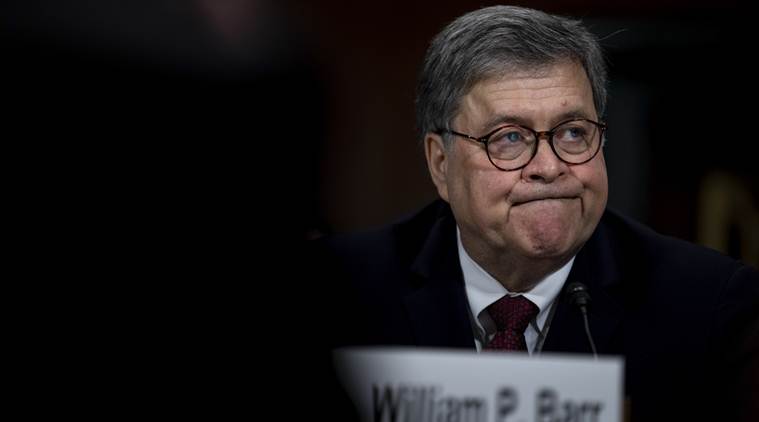
Written by Adam Goldman
President Donald Trump has given Attorney General William Barr extraordinary powers to declassify intelligence secrets as part of his review into how the 2016 Trump campaign’s ties to Russia were investigated. That means Barr could make documents or information from the CIA or the FBI public over their intense objections, setting up a possible confrontation between the law enforcement and intelligence communities.
As the president tries to find evidence that he was the target of a political witch hunt, former and current intelligence officials are worried about the exposure of secret sources and sensitive methods. “This was an attempted takedown of the president of the United States,” Trump said Friday.
Here is what we know about the origins of the investigation.
Why did the FBI investigate?
In July 2016, WikiLeaks released Democratic emails stolen by Russian military intelligence officers and posted thousands of internal Democratic National Committee documents revealing information about the Clinton campaign. That same month, the FBI learned that a Trump campaign adviser, George Papadopoulos, had told an Australian diplomat that he was told that the Russians had stolen Democratic emails before they were made public. FBI agents traveled to London to interview the diplomat and his assistant.
Those interviews, along with information about Russian hacking, were used to open the FBI’s investigation into whether any Trump associate had conspired with the Russian government. On Friday, Trump said he hoped that Barr would scrutinize the roles of the Australian and British governments in the opening of the FBI’s Russia investigation. Both countries work closely with the FBI and the CIA.
Who was under investigation?
As part of the early Russia inquiry, the FBI investigated four Trump associates: Papadopoulos; Paul Manafort, the Trump campaign chairman; Michael Flynn, the president’s first national security adviser; and Carter Page, another campaign foreign policy adviser.
The FBI focused on the men because of their Russian contacts. Flynn and Papadopoulos later pleaded guilty to lying to the FBI as part of the inquiry. Manafort was also convicted of tax fraud and other charges brought by the special counsel, Robert Mueller, who took over the investigation in May 2017. Manafort also and pleaded guilty to conspiracy.
Mueller’s investigators concluded that they did not have enough evidence to make a case that the men conspired with Russia’s election interference campaign. Investigators “did not find evidence likely to prove beyond a reasonable doubt that campaign officials such as Manafort, Papadopoulos and Page acted as agents of the Russian government — or at its direction, control or request — during the relevant time period,” they wrote.
What about claims of FBI spying?
Trump and his allies have focused their attention on the FBI’s use of an informant who met with Page and Papadopoulos to better understand the extent of their possible contacts with Russians. The informant, Stefan Halper, an American academic who taught at Cambridge University in Britain, met with the men while they were still Trump campaign advisers. Page visited Halper’s house in Virginia in August 2016, and Halper arranged a meeting with Papadopoulos the next month in London.
The FBI director, Christopher Wray, has said he was unaware of any illegal surveillance and has refused to call agents’ work “spying.”
In October 2016, more than two months after the investigation was opened, FBI agents and federal prosecutors obtained approval from a federal judge to wiretap Page. Trump’s allies have pointed to the warrant as major evidence that law enforcement officials were abusing their authority.
The wiretap application partly relied on Democratic-funded opposition research compiled into a dossier by Christopher Steele, a former British intelligence officer who was also an FBI informant. Former officials have long maintained that the dossier was not used to open the investigation in July 2016.
Why do we still care?
Because the story involves an attack on an American election by a foreign adversary, presidential authority, the national security bureaucracy and other levers of power, and because Trump persists in accusing the government officials who investigated him and his campaign of an illegal witch hunt — or as he said on Friday, the “greatest hoax probably in the history our country.”
No longer constrained by the Mueller investigation, Trump appears determined to find ways to prove his accusations that the American intelligence community acted inappropriately.
Trump’s allies and other skeptics have also suggested that the Russia investigation actually began earlier than FBI officials have said, suggesting that the bureau and foreign partners were plotting to take down Trump, rather than opening an inquiry based on facts. The Australian diplomat meeting with Papadopoulos was “paper cover for an investigation of the Trump campaign that was already underway,” Andrew C. McCarthy, a former federal prosecutor and contributing editor, wrote in National Review, a conservative magazine.
In his report, Mueller reaffirmed that the FBI had opened the Russia investigation after receiving the information about Papadopoulos from the Australian government on July 26, 2016.
What is Barr doing?
The attorney general has echoed the president’s concerns about spying on Trump’s campaign. Barr recently assigned John H. Durham, the top federal prosecutor in Connecticut, to examine the origins of the Russia investigation in a review that the attorney general is overseeing.
Barr also wants to know what the CIA and other U.S. intelligence agencies were doing in 2016 and what they knew about Russia’s effort to sabotage the election. The CIA director, Gina Haspel, was the agency’s station chief in London in 2016 when Australian officials passed Papadopoulos’s information about Russia’s email hacking to the United States and when Halper arranged his meeting with Papadopoulos. It is not clear what Haspel knew about the operation, but a person familiar with the events said that the British intelligence service MI-5 was made aware of FBI activities in London.
On Friday, the president said he hoped that Barr would look at Britain: “We’re going to find out what happened and why it happened.”